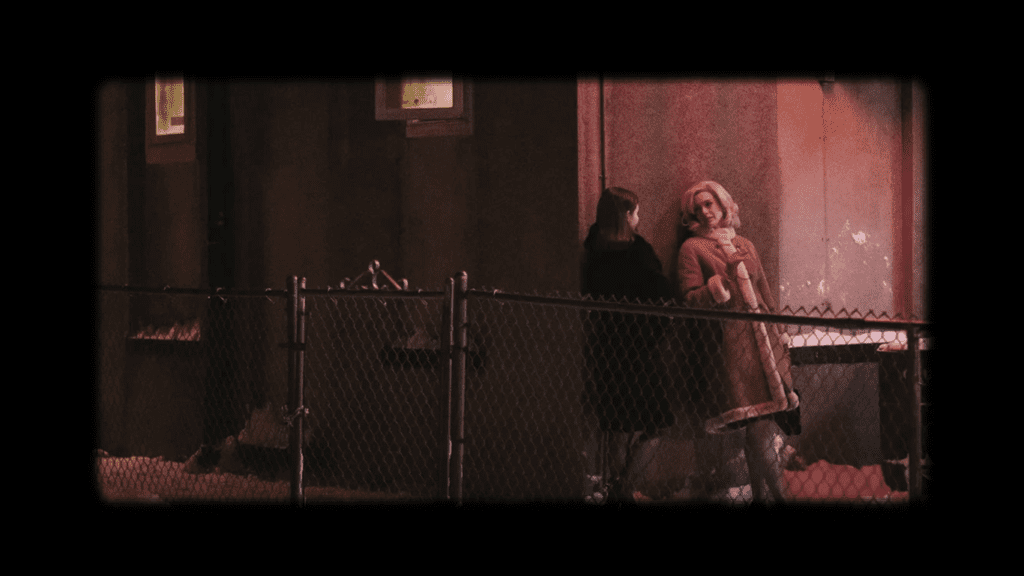
You can find a phenomenon in film school brats and cinema aficionados that goes like this, “Actors are only as good as the direction and technical elements of their project.” You’ll often hear the refrain, “Bad acting is just the sign of a bad director or script.” That comes from a general sense that what comes from behind the camera is more important than in front of the camera.
Eileen is the first film in seven years from director William Oldroyd, who hasn’t made a movie since his debut, Lady Macbeth, based on the book of the same name by Otessa Moshfegh. Eileen follows a young woman in a small New England town as she takes care of her alcoholic, retired, police chief father (Shea Wigham)and works at the local juvenile detention center. It stars Thomasin Mackenzie as the titular Eileen, seemingly resigned to being alone despite lusting for an intimate relationship. Her resignation changes when Anne Hathaway shows up as the new prison psychologist, Dr. Rebecca St. John, who takes an interest in Eileen.
I would have thought the lead part was explicitly for Mackenzie if I hadn’t known this was a novel before seeing the movie. She continues to crop up in interesting films from interesting directors, like Edgar Wright’s Last Night in Soho and Taika Waititi’s Jojo Rabbit. Despite this, she’s been typecast as the character she played in her breakout role in Debra Granik’s Leave No Trace. The only difference is starting in Soho, she’s added a dark side to the usual odd wallflower personality.
All of this brings me back to the story I told up top. Eileen is stylishly crafted and beautiful to look at. Oldroyd and Director of Photography Ari Wegner’s choice to shoot Mackenzie at a distance, through doorways and windows, highlights the way she views herself as a spectator to other people’s lives, not worthy of “main character” attention. When Hathaway shows up as the embodiment of everything Eileen is not, the camera punches in, full movie star glamor. The script hits the right notes of empathy and development for its main characters.
Films like these trick film students into thinking that what’s behind the camera is more important than what’s in front. I know this because I was one of them not particularly long ago. You spend one shoot standing in a 30-degree Boston fall night, poorly and unsafely stringing up a 12×12 flag while the talent sits waiting in a heated car, and you start to think such things, but as I matured, got more time in on set, and met more actors, I realized what was happening. All this work was to make the actors as comfortable and good-looking as possible. If the acting in Eileen isn’t good, the movie no longer works.
Hathaway’s inherent charisma carries this movie to the goal line. The production design and casting reinforce the inconspicuous nature of the main character by being the broadest representation of a 70s New England town. So when Hathaway appears as the Hitchcockian psychologist, Eileen takes an immediate fascination. St. John is the main character of the movie. Eileen sees herself as the extra, which makes it all the more shocking when St. John takes a potential romantic interest in her.
The third act twist of this movie, which I will not spoil, blows away the stylish and thoughtful (if tedious) first two acts. The best part of the movie is simply three women (Hathaway, Mackenzie, and Marin Ireland who gives the best performance in the film) in a room talking. Long takes, sparse production design, and simple lighting while three of the best actors in business execute their craft. The parts that break down for me during the first hour are the flights of fancy in which we see what Eileen wishes she could do. These moments go for shock value but ultimately undermine the movie’s end. Mackenzie is great in the role, and we don’t need to be told what she’s thinking. When we see Mackenzie fantasize about sex in public and shooting herself, it makes her decision toward the end of the film less of an exciting moment that reveals her true nature and more of a ticking time bomb that finally goes off. Oldroyd asks a lot of his actors, but they’re clearly up to the task. The filmmaking only accentuates their performances.
I want to clarify that writing, cinematography, editing, etc., are crucial to the final product and can make or break a film. But films like Eileen highlight how actors can carry a movie. For that reason, I’m an apostate cinematographer, converted to the church of letting actors cook.
Tyler Carcara is a filmmaker living in Los Angeles. He makes a weekly podcast where he, and his two cohosts, pitch podcasts! Trust me you’ll want to give it a listen. You can find it on Spotify here or by searching “The Podcast Podcast Podcast”.





